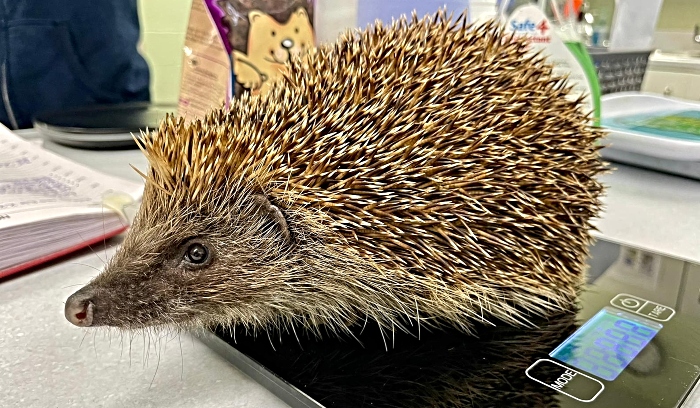
RSPCA staff in Nantwich are experiencing a spike in hedgehog season nationwide for three years, with intake numbers already higher than the whole of 2023.
Nationally, by mid-November well over 2,000 had been taken in this year by the charity’s four wildlife centres.
And RSPCA Stapeley Grange Wildlife Centre in Nantwich has so far admitted 626 hedgehogs.
Staff fear there are many more to come before the year ends – with numbers across England and Wales already 54% higher than in 2022 (1,296), and surpassing the 1,928 who were admitted during the entirety of last year (2023).
Lee Stewart, manager of Stapeley Grange, said: “Currently, every room and some of our outside sheds are full of hedgehogs here at Stapeley Grange.
“Managing hedgehogs, particularly at this time of year amid firework season and winter can be very challenging.
“It’s not only the general feeding, cleaning and care of hedgehogs but also finding space to put them.
“Once firework season is behind us we are able to start releasing them to the wild again; and then it’s all about keeping an eye on the weather.
“Once hogs are of a suitable weight we will need to ensure we have three nights above 5°C (41°F) before releasing them back into the wild.”
In September and October this year, 659 were admitted to RSPCA wildlife centres across the country – compared to 545 for the same period last year.
Many of these were found out during the day, a sign they are sick or injured, while others were young hedgehogs who need to put on more weight to survive hibernation over winter.
More than three quarters (77%) of 2023’s admissions were brought to the charity’s wildlife centres directly by concerned citizens.
The RSPCA wants people to know what to do if they see a stricken hedgehog.
RSPCA wildlife expert Dr Rebecca Machin said: “Most of the hedgehogs which the wonderful public are bringing in were found out and about during the day, which can be a sign of problems as hedgehogs are nocturnal animals.
“Many are young hedgehogs born later in the year, who haven’t put on enough weight to survive hibernation over the winter months.
“Our wildlife centre staff work very hard to care for these hedgehogs, which may require hand feeding, rehydration, and veterinary treatments before they can safely return to the wild.
“Once hedgehogs are healthy enough, our wildlife centre staff wait for a spell of relatively good weather, and for any fireworks celebrations to pass, before releasing them into the wild.”
Now, the RSPCA is urging the animal-loving public to be informed about when to intervene or not.
Rebecca added: “With the mild weather we have been experiencing, some hedgehogs have had a second litter so there may be small hedgehogs out and about, but there is still time for them to fatten up for winter.
“If they are being fed in the garden, we urge people to continue to do so and leave them where they are unless they are visibly weak, wobbly, injured or covered in parasites.
“Small hoglets may come out a little earlier in the evening to forage for food, so they should be monitored to check whether they genuinely seem unwell before taking them to a wildlife centre or vet.
“That way, the sickest hedgehogs can be prioritised for the help they need.”
A hedgehog may need your help if:
there’s an obvious sign of injury like a cut or a broken leg
if they’re lethargic, wobbly or walking in circles
if they have a large number of ticks or flies on them
if you see any maggots or fly eggs on them
if they don’t try to roll up when you approach them or touch them
if they’re not interested in the food you leave out
if it’s particularly cold (snowy, frosty or below zero for several days)
if they weigh less than 450g (approx 15.9oz – about the size of an apple)
if they’re in a dangerous place, such as on a road
There’s helpful advice on the RSPCA website about how to get help for animals as quickly as possible, and how to report cruelty and neglect to our specialist teams: rspca.org.uk/reportcruelty


















Are people able to “adopt” a hedgehog and if so how can they do this
Maybe it would help if habitats weren’t being destroyed by housing developers.